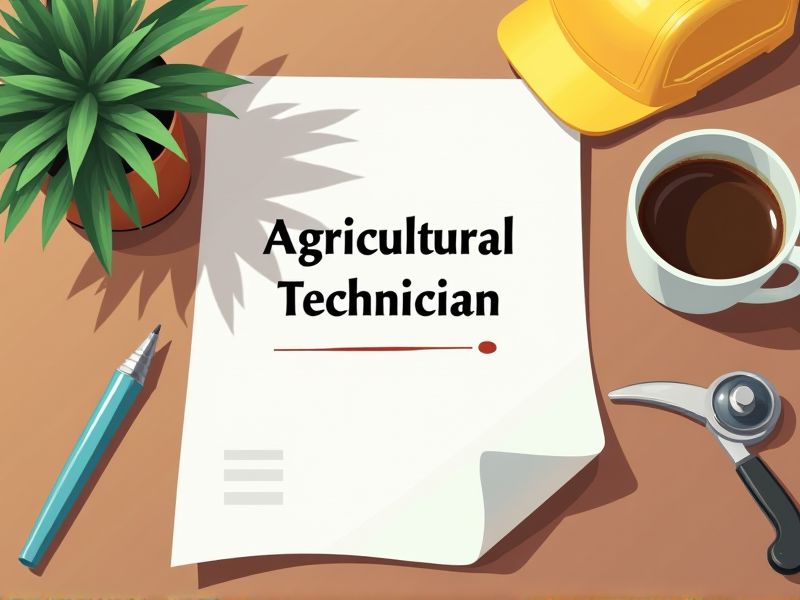
The complexity of modern agricultural machinery requires technicians to possess specialized knowledge and skills. Certifications ensure that technicians are proficient in handling, diagnosing, and repairing advanced equipment effectively. Industry standards and safety regulations demand that technicians stay up-to-date with the latest technological advancements and maintenance practices. Here are some important certifications needed for an Agricultural Equipment Technician.
Certified Agricultural Equipment Technician (CAET)
The increasing complexity of modern agricultural machinery necessitates skilled expertise to ensure efficient operation and maintenance. A Certified Agricultural Equipment Technician (CAET) provides specialized knowledge, which leads to improved machinery uptime and reduced downtime costs. Proper certification ensures adherence to safety standards, reducing the risk of accidents and equipment malfunctions. Certified technicians possess targeted troubleshooting skills, which enhance the lifespan and performance of agricultural equipment.
National Institute for Automotive Service Excellence (ASE) Certification
ASE Certification is important for Agricultural Equipment Technicians because it ensures they possess the required skills and expertise for handling complex machinery. Farmers and agribusinesses can trust ASE-certified technicians for reliable repairs, which reduces equipment downtime and increases productivity. Technicians with ASE Certification are more likely to stay updated with the latest industry standards and technologies, which is crucial as agricultural machinery becomes more advanced. Employers often prefer or require ASE-certified technicians, improving job prospects and potential earnings for those who hold the certification.
Diesel Engine Technician Certification
Obtaining Diesel Engine Technician Certification enhances an Agricultural Equipment Technician's competence in handling diesel-powered machinery, which is prevalent in agricultural operations. Certified technicians tend to have a deeper understanding of engine diagnostics and repair, reducing machinery downtime and boosting productivity. Certification often leads to increased trust from employers and clients, as it demonstrates a verified level of expertise. Machinery's technological advancement demands specialized knowledge, which certified technicians are more likely to possess, leading to safer and more efficient equipment operation.
Hydraulic Systems Technician Certification
Hydraulic systems are integral to the operation of modern agricultural machinery, enabling precise control of heavy equipment. Certification in hydraulic systems equips technicians with the necessary skills to diagnose and repair complex hydraulic issues efficiently. Proper certification ensures compliance with industry standards, reducing the risk of equipment failure and downtime. Certified technicians can improve equipment lifespan, boosting overall productivity in agricultural operations.
Electrical Systems Technician Certification
Electrical Systems Technician Certification is needed for an Agricultural Equipment Technician because modern agricultural machines increasingly rely on complex electrical systems that must be understood and maintained effectively. The certification ensures technicians possess the necessary knowledge and skills to troubleshoot and repair electrical issues, which reduces downtime and equipment failure. Having certified technicians boosts confidence among employers and customers, confirming a standardized level of competency. Certification may also play a role in meeting regulatory requirements and safety standards, contributing to overall operational efficiency and compliance.
Precision Agriculture Certification
Precision Agriculture Certification improves an Agricultural Equipment Technician's ability to diagnose and repair advanced machinery that incorporates technologies like GPS and sensors. Certification minimizes error, leading to higher efficiency in crop production through proper use and maintenance of precision tools. Farmers increasingly rely on data-driven insights, necessitating technicians who understand and support the integration of these technologies. Market demand grows for certified technicians, making certification beneficial for job security and career advancement.
Agricultural Machinery Maintenance Certification
Agricultural Machinery Maintenance Certification ensures technicians possess the necessary skills to efficiently repair and maintain complex agricultural equipment. Certification leads to reduced downtime and prolonged machine lifespan, enhancing farm productivity. Training includes real-world problem-solving and safety protocols, minimizing risks of operational hazards. Certified technicians contribute to improved efficiency and cost savings by optimizing equipment performance.
OSHA Safety Certification
OSHA Safety Certification is needed for Agricultural Equipment Technicians to ensure they understand and mitigate risks associated with heavy machinery, preventing workplace accidents. The certification educates technicians on proper handling protocols, significantly reducing the likelihood of injuries. Adherence to OSHA standards ensures compliance with federal regulations, avoiding potential legal and financial repercussions for employers. Certification enhances the technician's skillset, boosting employability and fostering a safer work environment.
Welding Certification
Welding certification enhances the skill set of agricultural equipment technicians, allowing them to perform repairs and maintenance more effectively. Certified technicians are better equipped to address complex issues involving metal components, reducing equipment downtime. The precision and safety that come with certification lead to improved machinery performance and operator safety. Employers often prefer certified technicians, as this certification indicates a recognized standard of competence and reliability.
Agricultural Technology Systems Certification
Agricultural Technology Systems Certification ensures that technicians possess the necessary skills to handle advanced agricultural machinery, leading to improved operational efficiency. It guarantees that technicians are equipped to deal with the complexities of modern equipment, reducing downtime due to misdiagnosis or repair errors. Certification fosters industry standards, ensuring consistency and quality across agricultural practices, which boosts trust among stakeholders. It enhances career prospects for technicians by validating their expertise in cutting-edge technology, thus meeting the demands of an evolving agricultural sector.
Summary
When you obtain certifications as an Agricultural Equipment Technician, your job prospects improve due to increased credibility. Employers are more inclined to offer you competitive salaries because of your enhanced qualifications. The new skills you acquire can lead to greater efficiency and productivity in your work. Certification also increases your chances for career advancement and specialization within the industry.
